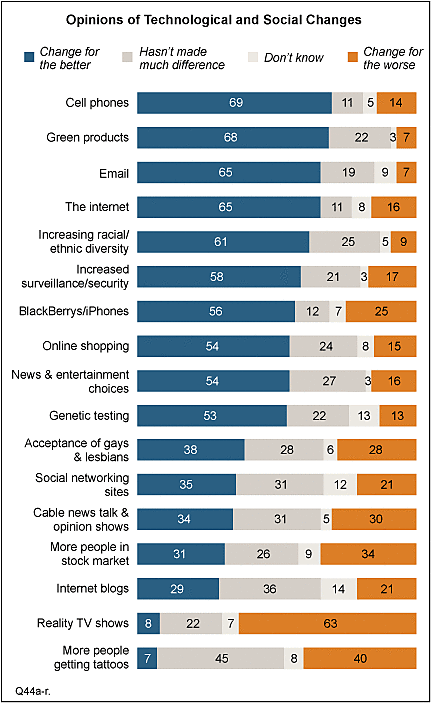A new Pew poll reveals that most of us think this decade’s been a bit of a bust—little enough surprise there. But when pollsters dug into people’s attitudes toward particular technological and social changes, I was a little taken aback by the incredible popularity of “increasing surveillance and security measures.” They’re not quite as popular as, say, the Internet—but folks love Big Brother better than iPhones, online retail, blogs, or reality TV. That may seem especially odd because even someone who regards those changes as necessary and appropriate cannot be glad that we now find them necessary—and you might expect the association to pull the numbers down.
I won’t get too depressed about this just yet, because I generally think it’s an error to take polls either too seriously—if you ask people for an opinion they don’t have, they’ll formulate one on the spot, but it’ll be about a millimeter thick—or too literally. If you read “How are you? / Fine thanks.” as a sincere inquiry into and report on someone’s welfare, you’re missing something rather elementary about our social world. Ditto, I think, if you assume that the large numbers of people who purport to be unsure whether Barack Obama is perhaps a secret foreigner literally believe in an insane conspiracy theory. It has a propositional form, but it’s more about signaling an attitude than a factual belief. When “confidence” in government spiked right after 9/11, should we suppose people had really revised their assessment of the government’s competence upward? Of course not, it was more like a vote of confidence. It’s like whispering “there’s no such thing as ghosts!” to yourself—something you do precisely when you don’t feel so certain anymore. (I’ve elsewhere referred to these as “symbolic beliefs.”)
So what are people doing when they say increased surveillance and security measures are a “change for the better.” Some people, of course, are really expressing a considered political opinion about the PATRIOT Act or other reforms. The phrase “security measures” may suggest to others just those measures which make us more secure—in the same way “Terrorist Surveillance Program” implies a program that surveils only terrorists, even if the rationale for the program is precisely the lack of sufficient evidence that its targets are terrorists. But I expect there’s also an element of “there’s no such thing as ghosts” at work. Given that our intelligence efforts fell spectacularly short at the decade’s start, we have to hope there’s been a net change for the better. And the downsides to expanded surveillance are largely invisible, slow, and structural: You have to go out of your way to think about them or they’re not especially evident. The rest of the survey items, though, prime people to think about “better” in terms of concrete differences in our daily experience. They may think of the inconveniences of lines at the airport, but there’s nothing in the rest of the context that seems likely to activate longer-term political concerns. The same question in a survey about other explicitly political trends might trigger a different response.
This is, incidentally, one reason I think privacy advocates make an understandable error when we put too much emphasis on the personal effects of expanded surveillance: “Do you want the government reading your e‑mail?” For a lot of people, this will just spotlight how little direct harm they seem to individually experience as a result of surveillance. It’s less dramatic an appeal, but you really do need to ask people to focus on what the explosion of surveillance means for the structure of a free society, not just gauge immediate consumer satisfaction.

